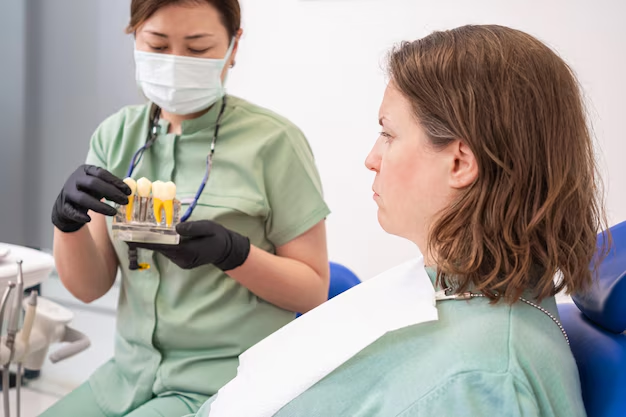Dental Hygienist Career Guide | Education, Salary, and Career Outlook
In the ever-evolving world of healthcare, dental hygiene stands out as a profession that not only offers stability and opportunity but also the chance to make a significant impact on individual health and well-being. The role of a dental hygienist is pivotal in promoting and maintaining oral health, preventing dental diseases, and educating patients on proper oral hygiene practices. This career path has gained considerable traction over the years due to its blend of patient interaction, scientific application, and educational guidance, appealing to many students looking to join the healthcare field.
Dating back to the early 20th century, the first dental hygiene program was established in 1913 by Dr. Alfred Fones in Bridgeport, Connecticut. Since then, the profession has grown immensely, with dental hygienists becoming integral members of the dental health team. Their expertise in preventive care, including cleaning teeth, applying sealants, and taking X-rays, plays a crucial role in the early detection and prevention of oral diseases.
Education and Training
High School Preparation
While specific high school courses are not mandatory, students aspiring to become dental hygienists can benefit significantly from taking science classes such as biology, chemistry, and health. These foundational courses help develop critical thinking and analytical skills essential for further dental studies.
Required Degrees and Certifications
To become a dental hygienist, the minimum educational requirement is typically an associate degree in dental hygiene, which can be obtained from community colleges or technical schools. However, there are also bachelor's and master's degree programs available for those who wish to advance their education and career opportunities.
Specialized Training Programs
Dental hygiene programs generally cover a wide range of subjects including anatomy, physiology, nutrition, radiography, and periodontology. These programs often integrate a mix of classroom instruction, laboratory work, and clinical practice to provide students with hands-on experience.
Licensing and Board Exams
After completing the required degree, aspiring dental hygienists must pass the National Board Dental Hygiene Examination—a comprehensive test that assesses knowledge and skills necessary for entry-level practice. Additionally, candidates must pass a regional or state clinical board examination to obtain licensure to practice in a specific state.
Continuing Education
Continuing education is vital to maintain licensure and stay abreast of advancements in the field. Dental hygienists are typically required to complete a set number of continuing education credits every renewal cycle, which can include attending workshops, conferences, or online courses.
Education Pathway Summary
| Step | Description | Example Programs/Institutions |
|---|---|---|
| High School | Focus on science courses | Local high schools |
| Associate Degree | Obtain degree in dental hygiene | Community colleges, technical schools |
| Bachelor's/Master’s Degree | Advanced education for more career opportunities | Universities and medical schools |
| National Board Exam | Pass written and practical exams | Administered by state or regional boards |
| Continuing Education | Ongoing courses to maintain licensure | Various online and in-person courses |
Skills and Qualities Needed
Essential Hard Skills
- Proficiency in Dental Procedures: Dental hygienists must be adept at performing teeth cleanings, scaling, and applying sealants to prevent cavities.
- Radiographic Skills: Familiarity with taking and interpreting dental X-rays is crucial for diagnosing dental issues.
Essential Soft Skills
- Communication Skills: Ability to effectively communicate with patients, explaining procedures and educating them on oral hygiene.
- Attention to Detail: Precision is necessary to ensure thorough cleanings and accurate assessments.
- Empathy and Patience: These skills are crucial when dealing with anxious or uncooperative patients.
Application in Real-World Settings
Dental hygienists utilize these skills daily—from removing plaque and tartar that brushing can't eliminate to teaching patients about the best brushing and flossing techniques. Communicating effectively with diverse patient populations ensures they understand the importance of oral health and adhere to recommended practices.
Salary
U.S. National Averages
The average annual salary for dental hygienists in the United States is approximately $77,000, though this can vary based on factors such as location, experience, and level of education.
Salary Range by Career Stage
| Career Stage | Salary Range |
|---|---|
| Entry-Level | $55,000 - $70,000 |
| Mid-Level | $70,000 - $85,000 |
| Experienced | $85,000 - $100,000+ |
Factors Affecting Salary
- Location: Urban areas or regions with higher living costs often offer higher salaries.
- Education Level: Hygienists with bachelor's or master's degrees may qualify for higher-paying roles.
- Specialization: Those who specialize in areas such as pediatric or geriatric dentistry might command higher salaries.
Career Outlook and Job Help
Job Growth Data
According to the U.S. Bureau of Labor Statistics (BLS), the employment of dental hygienists is projected to grow 9% from 2021 to 2031, faster than the average for all occupations. This growth is driven by an increased awareness of oral health's importance and the aging population's need for dental care.
Common Employment Settings
Dental hygienists can find employment in a variety of settings, including private dental offices, hospitals, public health clinics, and educational institutions.
Career Advancement Opportunities
With further education and experience, dental hygienists can advance to roles such as dental office managers, educators, or researchers. Some may opt to specialize in specific fields of dentistry.
Tips for Job Seekers
- Resume Building: Highlight experience in clinical settings and relevant skills.
- Networking: Join professional organizations such as the American Dental Hygienists’ Association (ADHA).
- Certification Renewals: Stay current with licenses and certifications through continuous learning and education.
Final Insights
Choosing a career as a dental hygienist offers a rewarding path filled with opportunities for personal and professional growth. Not only do you contribute to improving patients' health and quality of life, but you also enjoy a stable, well-compensated profession with a robust job market outlook. If you are a student with a passion for science, patient care, and education, becoming a dental hygienist is a fulfilling and valuable career choice that promises to make a lasting impact on the world of dental health.

